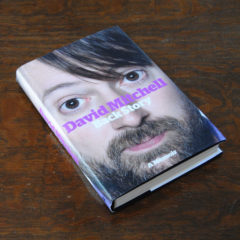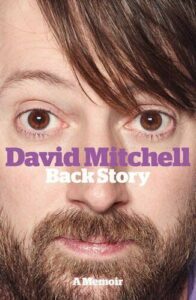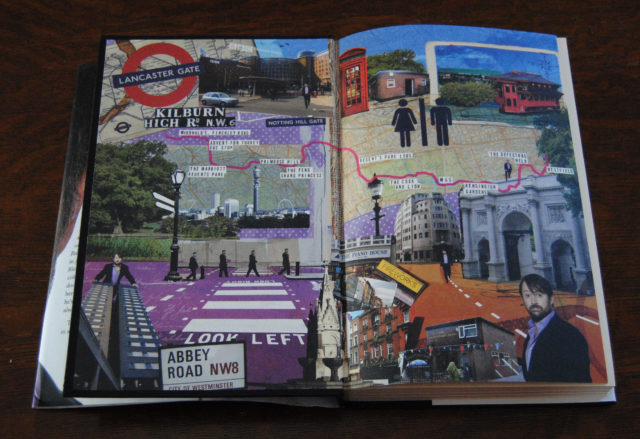
You may or may not know David Mitchell from Peep Show, Would I Lie To You or one of his many other panel show appearances, or he may be someone you know absolutely nothing about, but neither knowing him nor not knowing him should deter you from reading his back story in his autobiography David Mitchell: Back Story: A Memoir.
What Mitchell has written is perhaps the most authentic and self-critical autobiography I have, and may ever, read. It’s refreshing in that way, because he’s not afraid to take the piss out of the industry he’s in or, most often, himself.
And it’s not just for cheap laughs. He does this to make points, and he’s got a lot of points to make. The whole autobiography takes place during a walk. Cue front cover quote, “In 2007, David Mitchell was advised to start walking regularly to cure his mystery back problems. On one such walk, across London on a warm day in 2012, he reflects on everything from his comedy career and his love life to Sherlock Holmes, space travel and the etiquette of a gents’ toilet.”
While Mitchell makes no bones about who he is or what he does, and it’s possible to believe that he was just lucky, he did have to pay his dues, and he describes his journey in exquisite detail as only he can. “David Mitchell was born in 1974, and grew up in Oxford. He was miserable at a Dickensian primary school but happy at Cambridge, where he was president of Footlights and met his comedy partner Robert Webb. Together they have starred in the BAFTA-winning series That Mitchell and Webb Look and Peep Show.”
 This book is witty. Actually, this book makes witty look a bit dull. Mitchell has been perfecting his storytelling for years and his off-the-cuff humour has been honed in front of our very eyes on “every British TV or radio panel show except Never Mind the Buzzcocks and Quote Unquote.”
This book is witty. Actually, this book makes witty look a bit dull. Mitchell has been perfecting his storytelling for years and his off-the-cuff humour has been honed in front of our very eyes on “every British TV or radio panel show except Never Mind the Buzzcocks and Quote Unquote.”
I came to know David Mitchell through many of those panel shows thanks to their availability online. And I’m not sure exactly what prompted me to look into the idea of him having a book, excepting that perhaps it was mentioned on an episode of Would I Lie to You, which would make the most sense, since I remember “So my aim is that my appearance should in no way be noteworthy. But then again, not so un-noteworthy as to be in itself noteworthy.” being a quote that was used during the show that I read in this very book.
Do I think you need to know who David Mitchell is to read this book? I absolutely do not. I think it’s a great story that also deals with some absolute truths, and some very pithy narrative observations. But, then again, I also tend to agree with Mitchell more often than not, so who am I really, but a man pushing his own agenda, perhaps. Nevertheless, I’ll set forth ten quotes from the book that I feel prove my point, but that also contain enough context as to be noteworthy without having read the prior or next paragraphs or lines.
- My childhood self would hate where I live now. He would also be disappointed that I’m not ruler of the world or at least Prime Minister or a wizard.
- We do not, sadly, live in a society that values teaching very highly as a profession. We live in a society that pretends to, but gives the big money to footballers and bankers (and more to comedians and actors than they are probably worth, I’m very happy to admit, but personally I’m in it for the disproportionate praise).
- Dark or light, satirical or wacky, message-bearing or surreal, comedians are just fools capering for a king’s pleasure.
- …my overwhelming emotion was of having averted disaster – which, if anything, feels better than a triumph.
- But, yes, I try to analyse things rigorously – partly because that’s a good approach to life in general and partly because it’s easier to find comic angles that way than by trying to nudge myself into flights of surreal invention.
- Maybe I was just talentless, I thought in dark moments. But then I’d turn on the television, watch a few minutes of primetime and remind myself that talentlessness was no barrier to success.
- As I prepared for Edinburgh in 1997, failure felt both unthinkable and inevitable. There’s a lot of crossover between those two qualities – probably because there’s not much point in thinking about the inevitable. That’s my view, at least – I would never have made much of a philosopher or priest.
- It took me a long time to realise how little was going on here. I naively thought that people in offices were busy – that if you worked in TV, you were constantly rushed off your feet making programmes or having meetings about programmes you were about to make. Occasionally, I thought, you might find time to squeeze in a chat with someone new, someone promising with no track record, but only in order to get them working on an idea that would, in time, become a TV programme. The reality is that meeting new people and aimlessly chatting about ideas basically is the TV industry. Hundreds make their living in perpetually salaried ‘development’, seldom troubling a cameraman. Only under exceptional circumstances is a show actually made, at which point the key idea-developers, the ones who have meetings, often delegate that task to others. Our little chats with TV companies had only been about making contact, acknowledging each other’s existence, as part of the vast, inefficient, meandering dance which the comparatively small amount of actual TV production manages to support.
- For years I resisted a smartphone because email, I felt, was something that should always be able to keep until I got home. If it’s urgent, let people ring or text. An email is like a letter – people shouldn’t expect a response in less than a day or two. But, if they get wind of the fact that you can receive emails 24/7, the timetable on which they expect a response suddenly shortens.
- …I always feel a bit guilty – I think feeling guiltless is somehow impolite.
So, if the quotes are enough for you, I hope you enjoyed them as much as I did collecting them by reading the book, and if you want more, go and get yourself a copy of David Mitchell: Back Story: A Memoir, you can thank me later.

Read the Secret File of technical information and quotes from David Mitchell: Back Story: A Memoir.